Module 1 Life in the future 精读课课件
文档属性
| 名称 | Module 1 Life in the future 精读课课件 |  | |
| 格式 | rar | ||
| 文件大小 | 240.4KB | ||
| 资源类型 | 教案 | ||
| 版本资源 | 外研版 | ||
| 科目 | 英语 | ||
| 更新时间 | 2010-06-02 20:28:00 | ||
图片预览

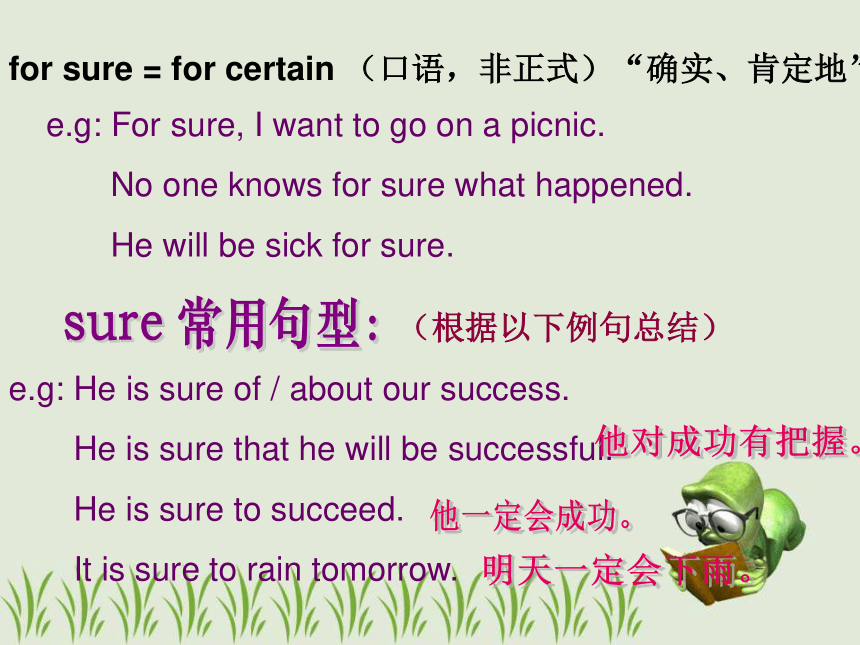
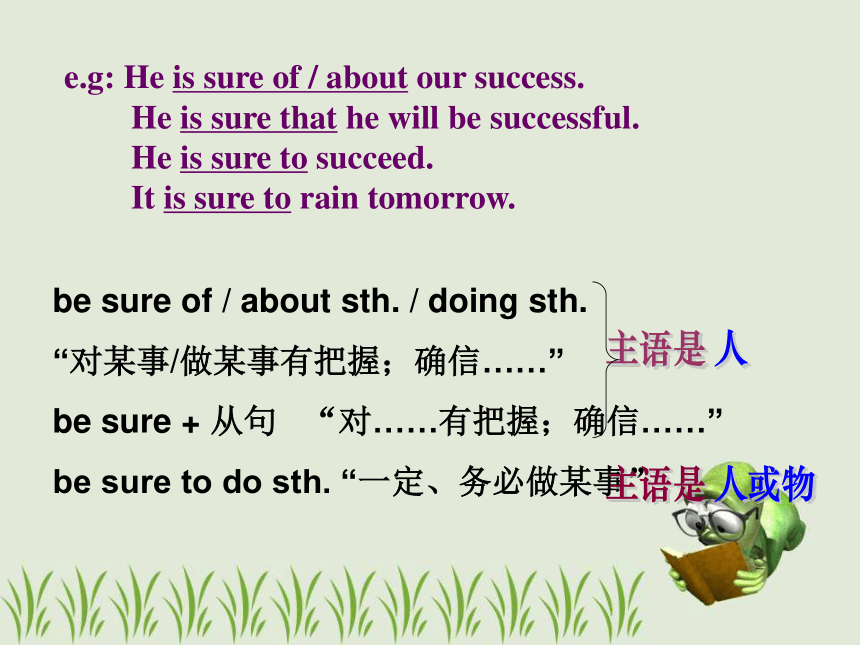

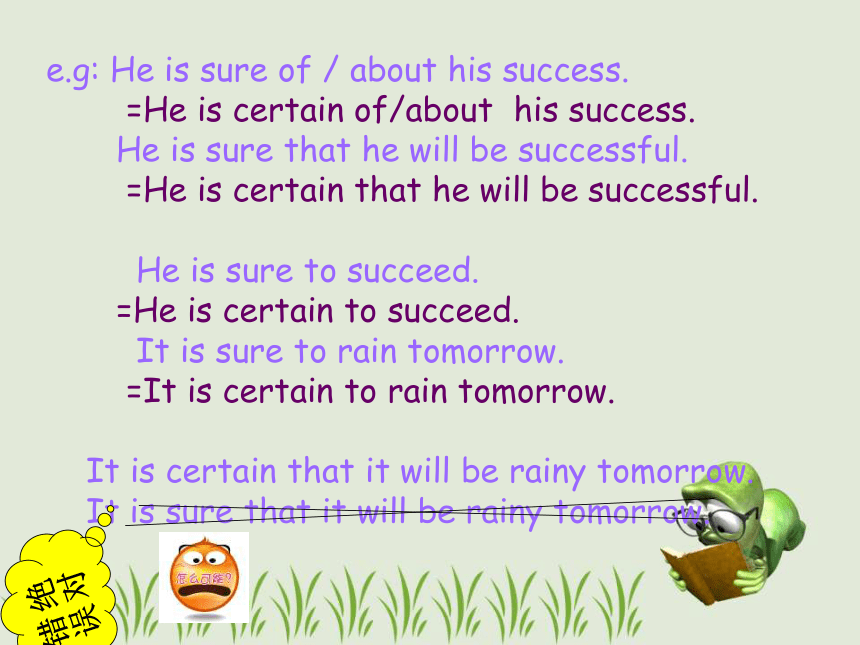
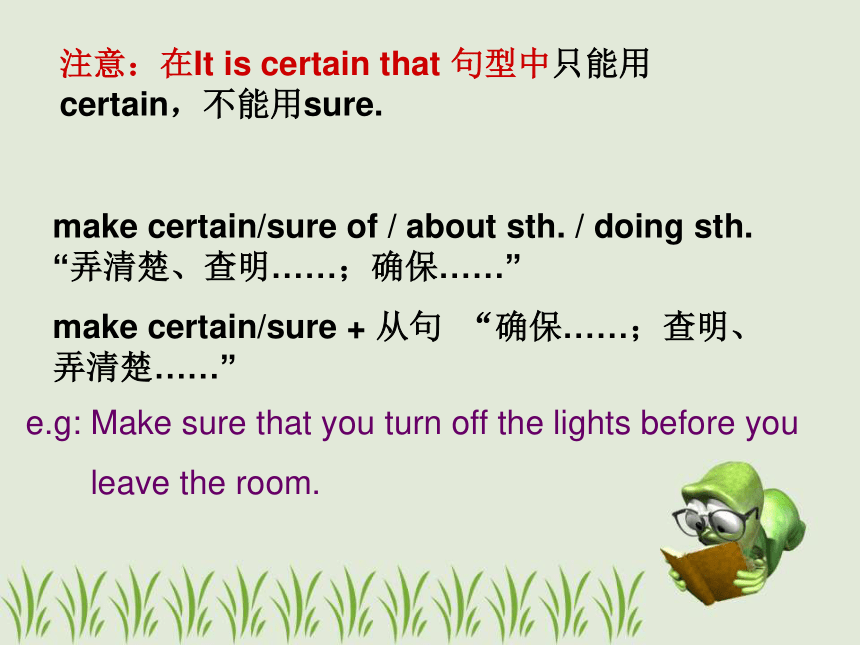
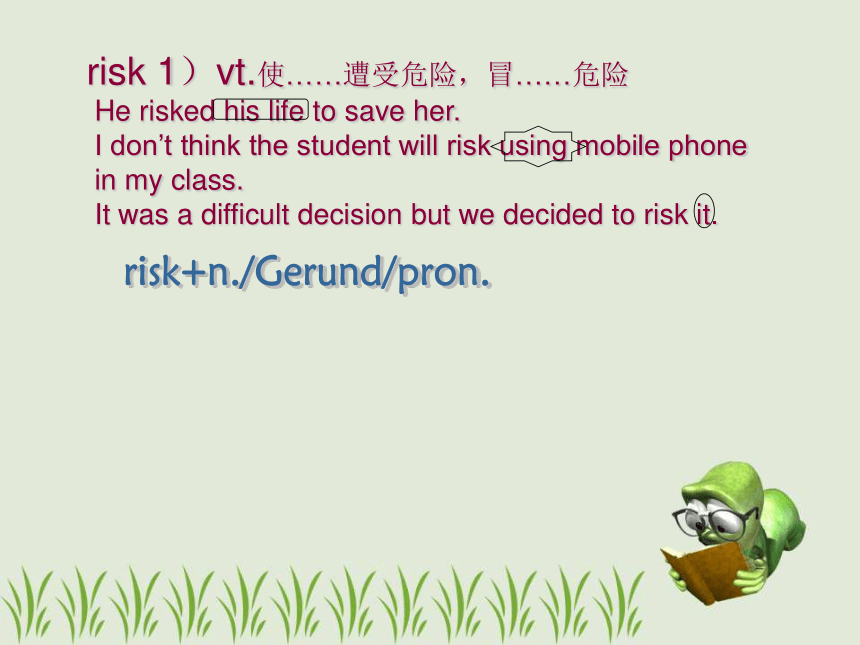
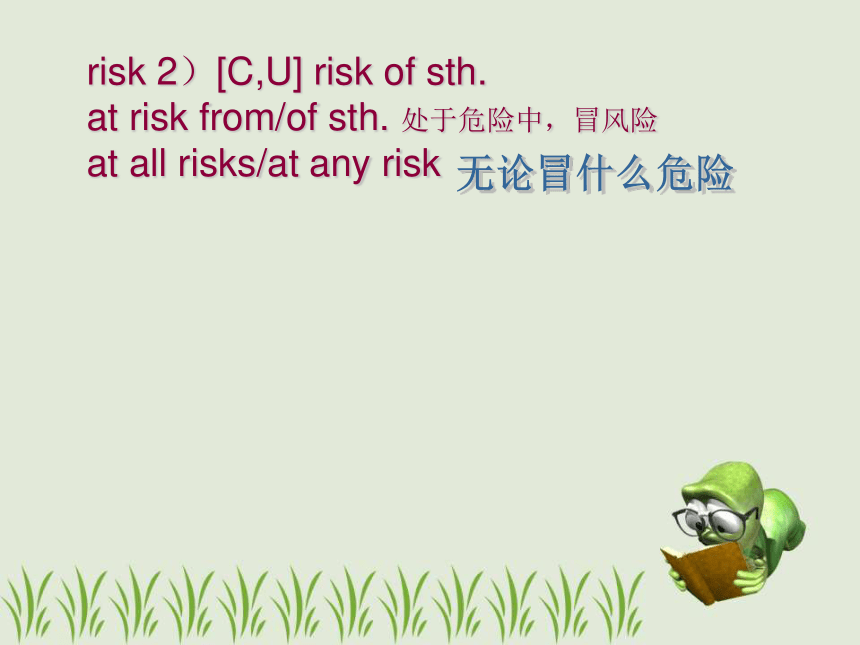
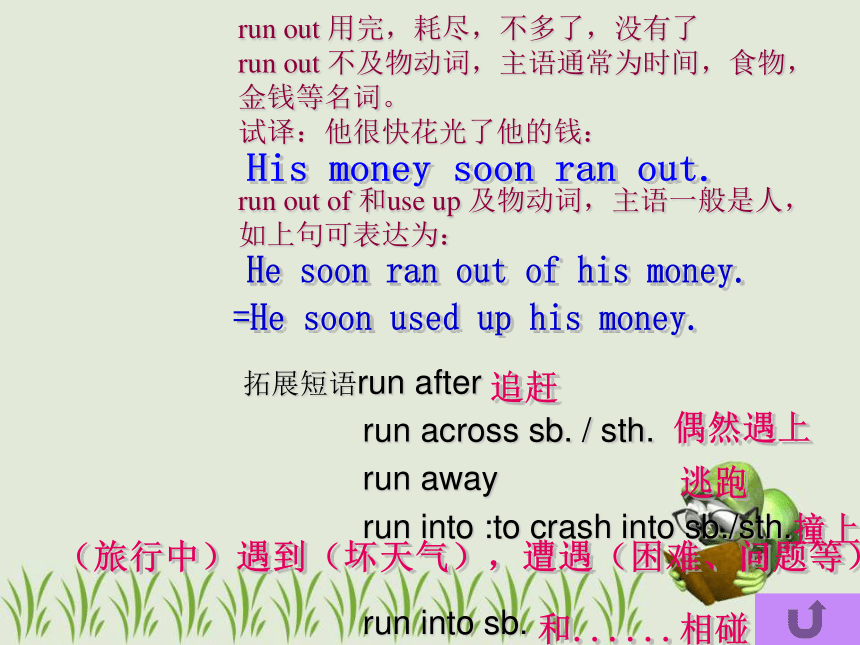
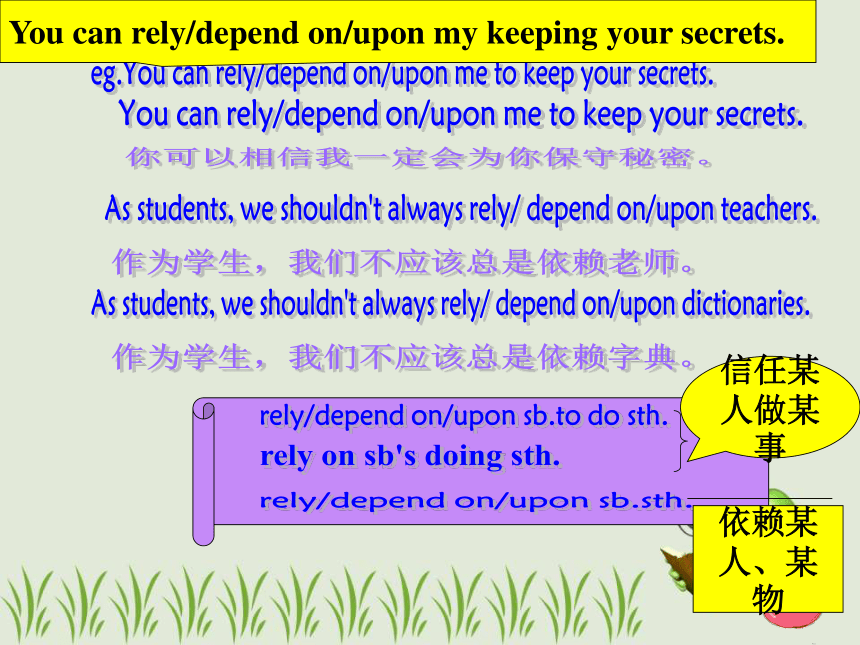

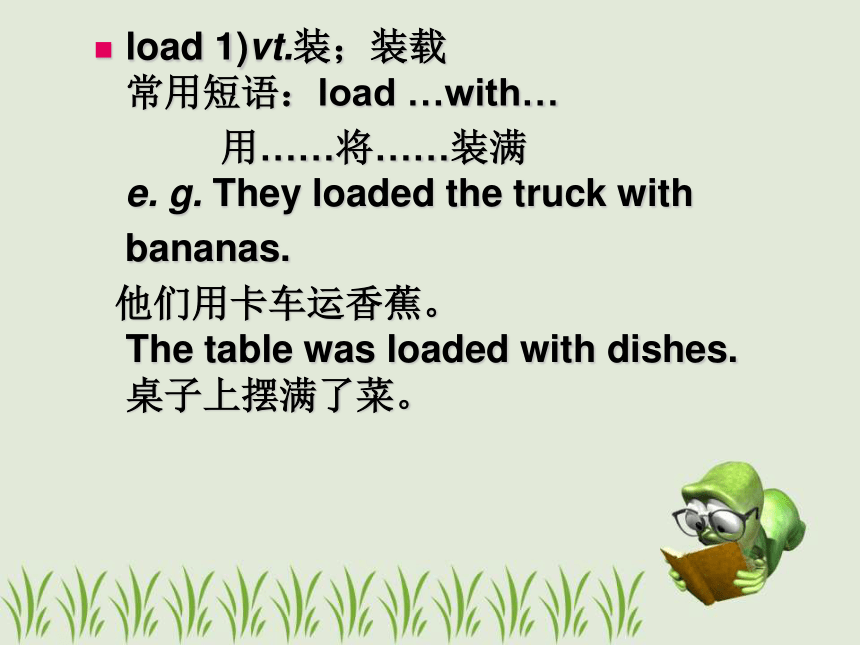
文档简介
课件36张PPT。The city of the future外研版英语
必修四 模块一Detail ReadingDetail Readingfor sure = for certain (口语,非正式)“确实、肯定地”e.g: For sure, I want to go on a picnic.
No one knows for sure what happened.
He will be sick for sure.e.g: He is sure of / about our success.
He is sure that he will be successful.
He is sure to succeed.
It is sure to rain tomorrow.他对成功有把握。他一定会成功。明天一定会下雨。sure 常用句型:(根据以下例句总结)be sure of / about sth. / doing sth.
“对某事/做某事有把握;确信……”
be sure + 从句 “对……有把握;确信……”
be sure to do sth. “一定、务必做某事” 主语是人主语是人或物 e.g: He is sure of / about our success.
He is sure that he will be successful.
He is sure to succeed.
It is sure to rain tomorrow.sure与certain二者在多数句型中通用
be certain to do sth. 表示说话人的观点,说话人“确信、肯定”
be certain of /about/sth./doing sth. 以及
be certain that从句 表示主语“确信”自己……e.g. John is certain to win. 约翰肯定会赢。
John is certain of winning. 约翰确信会取胜。e.g: He is sure of / about his success.
=He is certain of/about his success.
He is sure that he will be successful.
=He is certain that he will be successful.
He is sure to succeed.
=He is certain to succeed.
It is sure to rain tomorrow.
=It is certain to rain tomorrow.
It is certain that it will be rainy tomorrow.
It is sure that it will be rainy tomorrow.绝对错误make certain/sure of / about sth. / doing sth. “弄清楚、查明……;确保……”
make certain/sure + 从句 “确保……;查明、弄清楚……”e.g: Make sure that you turn off the lights before you
leave the room. 注意:在It is certain that 句型中只能用 certain,不能用sure. risk 1)vt.使……遭受危险,冒……危险 He risked his life to save her. I don’t think the student will risk using mobile phone in my class. It was a difficult decision but we decided to risk it. risk+n./Gerund/pron.risk 2)[C,U] risk of sth. at risk from/of sth. 处于危险中,冒风险 at all risks/at any risk 无论冒什么危险 run out 用完,耗尽,不多了,没有了 run out 不及物动词,主语通常为时间,食物,金钱等名词。 试译:他很快花光了他的钱: run out of 和use up 及物动词,主语一般是人,如上句可表达为:拓展短语run after
run across sb. / sth.
run away
run into :to crash into sb./sth.
run into sb.His money soon ran out.He soon ran out of his money.=He soon used up his money.追赶偶然遇上逃跑撞上和......相碰(旅行中)遇到(坏天气),遭遇(困难、问题等)
rely/depend on/upon sb.to do sth.eg.You can rely/depend on/upon me to keep your secrets.You can rely/depend on/upon me to keep your secrets.rely/depend on/upon sb.sth.As students, we shouldn't always rely/ depend on/upon teachers.As students, we shouldn't always rely/ depend on/upon dictionaries.你可以相信我一定会为你保守秘密。作为学生,我们不应该总是依赖老师。作为学生,我们不应该总是依赖字典。You can rely/depend on/upon my keeping your secrets.rely on sb's doing sth.信任某人做某事依赖某人、某物get rid of “摆脱、除掉、处理掉”
e.g. We have to get rid of bad habits.
我们必须改掉坏习惯。get together 相聚 get up 起床
get across 传播 get along 进展,前进
get along with sb. 与……相处
get around (消息)传开;四处走走load 1)vt.装;装载 常用短语:load …with…
用……将……装满 e. g. They loaded the truck with
bananas.
他们用卡车运香蕉。 The table was loaded with dishes. 桌子上摆满了菜。 2)c.n.装载物(量); 工作量;(精神等方面的)负担,负荷 e. g. He climbed the hill with a heavy load on his back every day.
他每天背负重物爬山。 e. g. The teachers’ work load in our school is about 10 hours a day. 我们学校老师的工作量每天约十个小时。 The sick child is a heavy load for his father to bear. 那个生病的小男孩让他的父亲心力交瘁。 Instead adv. “顶替,代替,反而,却”否定上文提到的事物。
一般放在句末,如位于句首或句中时常用逗号与后面隔开,instead 可单独在句中作状语。
e. g. Lily isn't here. Ask Lucy instead.
Lily不在这儿,去问Lucy吧。
She didn't answer me, instead, she asked me another question.
她没有回答我,反而问了我另外一个问题。 Instead of 介词短语“代替,而不是,而没有”, 否定of后面的宾语。
其后常接宾语,且宾语多由名词、代词、介词短语、动词 + ing 形式充当。
e. g. We‘ll ask Li Mei instead of Mary.
我们将去问李梅而不问玛丽。
I'll go instead of her.
我会替她去。 Can you find a sentence using full
inversion(全倒装)in paragraph2?Here are some of the ideas they had.Below is a description of
a simple scientific
experiment.全部倒装是只将句子中的谓语动词全部置于主语之前。
此结构通常只用与一般现在时和 一般过去时。常见的
结构有: 1) here, there, now, then, thus等副词置于句首,谓语动词常用be, come, go, lie, run。
There goes the bell.
Then came the chairman.
Here is your letter. 2) 表示运动方向的副词或地点状语置于句首,谓语是表示运动的动词。
Out rushed the students.
Ahead sat an old woman.
注意:上述全部倒装的句型结构的主语必须是名词,如果主语是人称代词则不能完全倒装。
Here he comes. Away they went.
limit n. 界限,限度,限制(常用复数形式)
vt.限制,限定 limit sb. to (doing) sth.
限制某人做某事
E.g. There is a limit to the pain we can bear.
He knows the limits of his power.
他知道自己的权限。
My mother limits the amount of food that I eat.
我母亲限制我的饭量。
我们能忍受的疼痛是有限度的。相关短语:
within……limits 在……范围内
≠ without limit 无限地
within limits 在某种程度上,有一定限制
E.g. I am willing to help you, within limits.
在某种程度上,我愿意帮助你limitless adj.无限制的,无界限的,
limited adj. 有限的,少的
limitation n. 限定;限制
短语:set a limit to/put a limit on 限制
E.g. Set a limit to/put a limit on the passengers.
限制乘客人数
command
① [c] n.命令
②[u] n.控制,管辖,指挥
③v.命令,指挥,拥有
我发出命令时开始。Begin when I give the command.e.g. He has a hundred men under his command.他掌管着100人。e.g. The officer commanded his men to fire. Command+that引导的宾语从句时用虚拟语气,其谓语动词:
(should)+动词原形
E.g. He commanded that the prisoners (should) be shot.
他命令将犯人枪杀。
短语:have/take command of 指挥
do sth. at/by one’s command 奉某人之命做事
be at one‘s command 听某人吩咐
have a good command of 对……掌握的很好
in command of sth. 统帅 (主语一般是人)
in/under the command of sb. 由某人统帅(S物)
--Who is in command of the army? 谁统率陆军?
--The army is in the command of General Brown.
陆军由布朗将军统率。
place orders 订购 = place an order
1) order n. 作“订货”、“订货单”、“命令”解:
E.g. The factory has received an order for 2,000 machine tools. 工厂收到了一张要买2,000 台机床的订货单。
2) order n. 作“顺序”、“次序”、“整齐”、“秩序”解:
E.g. The machine is in good working order.
机器运转良好。
The four seasons follow in order.
四个季节依次轮换。
3) order v. 作“定制”、“订购”; “命令”
E.g. The doctor ordered him to stay there.
医生嘱咐他留在那里。
order sb. to do sth. 命令某人做某事
order that...
表示“命令” 含义时宾语从句用虚拟语气:
The general ordered that all the soldiers should retreat from the front.
将军命令所有的士兵撤离前线。
用“in order+带to的不定式”表示目的状语:
E.g. In order to earn enough money, he worked late into the
night. 为了赚到足够的钱, 他工作到深夜。
用“in order that”引导目的状语从句:
E.g. I am saving money in order that I can buy a house.
我正在攒钱,以便我能买一所房子。
短语:on order
在订购中
out of order
有毛病, 不整齐,出故障
in order
井然有序 让步状语从句是状语从句中的一种,一般翻译为“尽管……即使……”就是我们日常生活中用的“退一步说……”的感觉。
引导让步状语从句的连词主要有以下这些:though, although, as(虽然); even if=even though(即使)whether...or... “不论是否……”,“不管是……还是……” 。 ; no matter+疑问词,疑问词-ever。
no matter +疑问词=疑问词+ever,=“不管 / 无论……”。
No matter what=whatever 无论什么
No matter when=whenever 无论何时
No matter where=wherever 无论哪里
No matter how=however 无论怎样
No mater which=whichever 无论哪一个
No matter who=whoever 无论谁
1. “疑问代词 + ever”可引导两种类型的从句,即让步状语从句和名词性从句(主语从句、宾语从句), 时间或地点状语从句。 No matter +疑问词只引导让步状语从句。
(1)引导让步状语从句。
E.g. Whatever happened, he wouldn't say a word.
= No matter what happened, he wouldn't say a word.
Whoever says so, it is wrong.
= No matter who says so, it is wrong.
Whichever dictionary you (may) take, you will have to pay at least 20 dollars.
= No matter which dictionary you (may) take, you
will have to pay at least 20 dollars.
注意:这类从句中应用一般现在时表将来,从句中也常用情态动词 may / might .
(2)引导名词性从句。例如:
Whoever smokes here will be punished.
(主语从句)
Beggars will eat whatever they are given.
(宾语从句)
(3)引导时间或地点状语从句
Whenever we see him, we speak to him.
(时间状语从句从句)
了解:
You may invite whoever / whomever you like. (常用 whoever 代替 whomever)
此时它们都不能换成“ no matter + 疑问词”的形式,但 whoever 等于 anyone who, whatever 等于 anything that. charge vt. 收费,要价
charge sth./sb. for sth 要价
charge sb. some money for sth.
Eg. *He does not charge at all for his service.
他完全不收费 *He charged the guests 200 yuan for the meal.
charge v. 指控,控告
charge sb with sth/doing sth
Eg. He was charged with murder.
他被指控犯有谋杀罪。
The driver is charged with speeding.
司机被控告超速驾驶。
charge n. 费用
in charge of 管理,负责,主管(主动)E.g. Our class is in charge of the young
trees around the classroom building.
in the charge of 由……管理(被动含义)
我们班级负责照管教学楼周围的小树。
E.g. The hospital is in the charge of Professor
Wang.这家医院由王教授主管。
free of charge免费free of charge 免费
E.g. The ticket is free of charge. 这票是免费的。
Free 的短语
be free and easy随便的,无忧无虑的,逍遥自在的,不拘礼的
E.g. The boy is so free and easy that he is always absent from school. 这孩子太自由散漫以致经常旷课。
be free to do sth. 随心所欲地做某事
You are free to do what you like. 你们想干什么就干什么
for free免费地
E.g. Mr Li gave me a book for free.李老师免费给我一本书
be free of sth. ①离开某物 ②摆脱(没有)某物
=be free from sth.
E.g. The ship was free of the harbor. 船已离开港口。
be free with sth. 对某物大方,慷慨。
E.g. He is free with his money. 他用钱很大方区分 common; usual ; ordinary ; normal; regular
(1) common普通的;常见的;共有的;共同的
【短语】common sense常识 It is common sense to carry an umbrella in case of rain.
带上雨伞以防有雨,这是一个常识。 Tom is a common name in Britain. 一个常见的名字。 We have a common interest.我们有着共同爱好。 They have much in common with each other.
他们有很多相同之处
have sth. /much /a little/nothing in common
有...很多/一点/没有共同之处
(2) usual 惯常的;惯例的;习惯性的;遵循常规的
【短语】as usual与平常一样 It's usual for him to go to the office on foot.
对他来说,走路上班是经常的事。 He went to school on foot as usual.
(3) ordinary 平凡的;普通的? We are ordinary people. 我们都是凡人。 He is an ordinary worker.他是个普通的工人。
(4) normal? adj. 正常的;正规的;标准的 The normal temperature of the human body
人们的正常温度 normal behaviour (thinking/ views)
正常的行为(思想/观点)
(5) regular 规则的;有规律的;经常的 Our heart is beating regularly.
我们的心脏是有规律地跳动。 Mr. Goodman is a regular customer of ours.
古得曼先生是我们的常客。 Carry out “执行,实施,完成,实现”
E.g. carry out a promise/ a plan/ an order/ an experiment实现诺言、实施计划、执行计划、进行试验拓展短语:
Carry on “继续、进行下去”
Carry on sth./ doing sth.
Carry on with sth. (= go on with sth.)We can carry on the discussion after lunch. E.g. 午饭后我们可以继续讨论。With 复合结构He felt safe with his mum standing behind him.
He went to the library with his homework finished.
With a lot of homework to do, he isn’t free.
He is used to sleeping with the windows open.
He likes reading with his MP3 on.
He went out with a stick in his hand.
with + n. + doing (分词与宾语在逻辑上是主谓关系)with + n. + -ed (分词与宾语在逻辑上是动宾关系)with + n. + to dowith + n. + adj.with + n. + adv.with + n. + prep.attach vt. attached adj. 依恋的,附属的
attachment n. 附加物,附加,连接物
1) attach sth.to sth. 把……固定,把……附在……上 *
E.g. I attached a wire to the radio.我在收音机上接了根电线
2)attach importance (value, weight, etc)to sth.
认为某事有重要性(价值,分量……)
E.g. I attach great importance to this research.
我认为这项研究很重要。
3)与……有联系
E.g. No one is suggesting that any health risks attach to this
product. 没人指出这种产品可能会危害健康。
及时反馈:
When choosing a product, people always try to figure out the meaning which is attached its brand name.
A. to B. on C. with D. forA
必修四 模块一Detail ReadingDetail Readingfor sure = for certain (口语,非正式)“确实、肯定地”e.g: For sure, I want to go on a picnic.
No one knows for sure what happened.
He will be sick for sure.e.g: He is sure of / about our success.
He is sure that he will be successful.
He is sure to succeed.
It is sure to rain tomorrow.他对成功有把握。他一定会成功。明天一定会下雨。sure 常用句型:(根据以下例句总结)be sure of / about sth. / doing sth.
“对某事/做某事有把握;确信……”
be sure + 从句 “对……有把握;确信……”
be sure to do sth. “一定、务必做某事” 主语是人主语是人或物 e.g: He is sure of / about our success.
He is sure that he will be successful.
He is sure to succeed.
It is sure to rain tomorrow.sure与certain二者在多数句型中通用
be certain to do sth. 表示说话人的观点,说话人“确信、肯定”
be certain of /about/sth./doing sth. 以及
be certain that从句 表示主语“确信”自己……e.g. John is certain to win. 约翰肯定会赢。
John is certain of winning. 约翰确信会取胜。e.g: He is sure of / about his success.
=He is certain of/about his success.
He is sure that he will be successful.
=He is certain that he will be successful.
He is sure to succeed.
=He is certain to succeed.
It is sure to rain tomorrow.
=It is certain to rain tomorrow.
It is certain that it will be rainy tomorrow.
It is sure that it will be rainy tomorrow.绝对错误make certain/sure of / about sth. / doing sth. “弄清楚、查明……;确保……”
make certain/sure + 从句 “确保……;查明、弄清楚……”e.g: Make sure that you turn off the lights before you
leave the room. 注意:在It is certain that 句型中只能用 certain,不能用sure. risk 1)vt.使……遭受危险,冒……危险 He risked his life to save her. I don’t think the student will risk using mobile phone in my class. It was a difficult decision but we decided to risk it. risk+n./Gerund/pron.risk 2)[C,U] risk of sth. at risk from/of sth. 处于危险中,冒风险 at all risks/at any risk 无论冒什么危险 run out 用完,耗尽,不多了,没有了 run out 不及物动词,主语通常为时间,食物,金钱等名词。 试译:他很快花光了他的钱: run out of 和use up 及物动词,主语一般是人,如上句可表达为:拓展短语run after
run across sb. / sth.
run away
run into :to crash into sb./sth.
run into sb.His money soon ran out.He soon ran out of his money.=He soon used up his money.追赶偶然遇上逃跑撞上和......相碰(旅行中)遇到(坏天气),遭遇(困难、问题等)
rely/depend on/upon sb.to do sth.eg.You can rely/depend on/upon me to keep your secrets.You can rely/depend on/upon me to keep your secrets.rely/depend on/upon sb.sth.As students, we shouldn't always rely/ depend on/upon teachers.As students, we shouldn't always rely/ depend on/upon dictionaries.你可以相信我一定会为你保守秘密。作为学生,我们不应该总是依赖老师。作为学生,我们不应该总是依赖字典。You can rely/depend on/upon my keeping your secrets.rely on sb's doing sth.信任某人做某事依赖某人、某物get rid of “摆脱、除掉、处理掉”
e.g. We have to get rid of bad habits.
我们必须改掉坏习惯。get together 相聚 get up 起床
get across 传播 get along 进展,前进
get along with sb. 与……相处
get around (消息)传开;四处走走load 1)vt.装;装载 常用短语:load …with…
用……将……装满 e. g. They loaded the truck with
bananas.
他们用卡车运香蕉。 The table was loaded with dishes. 桌子上摆满了菜。 2)c.n.装载物(量); 工作量;(精神等方面的)负担,负荷 e. g. He climbed the hill with a heavy load on his back every day.
他每天背负重物爬山。 e. g. The teachers’ work load in our school is about 10 hours a day. 我们学校老师的工作量每天约十个小时。 The sick child is a heavy load for his father to bear. 那个生病的小男孩让他的父亲心力交瘁。 Instead adv. “顶替,代替,反而,却”否定上文提到的事物。
一般放在句末,如位于句首或句中时常用逗号与后面隔开,instead 可单独在句中作状语。
e. g. Lily isn't here. Ask Lucy instead.
Lily不在这儿,去问Lucy吧。
She didn't answer me, instead, she asked me another question.
她没有回答我,反而问了我另外一个问题。 Instead of 介词短语“代替,而不是,而没有”, 否定of后面的宾语。
其后常接宾语,且宾语多由名词、代词、介词短语、动词 + ing 形式充当。
e. g. We‘ll ask Li Mei instead of Mary.
我们将去问李梅而不问玛丽。
I'll go instead of her.
我会替她去。 Can you find a sentence using full
inversion(全倒装)in paragraph2?Here are some of the ideas they had.Below is a description of
a simple scientific
experiment.全部倒装是只将句子中的谓语动词全部置于主语之前。
此结构通常只用与一般现在时和 一般过去时。常见的
结构有: 1) here, there, now, then, thus等副词置于句首,谓语动词常用be, come, go, lie, run。
There goes the bell.
Then came the chairman.
Here is your letter. 2) 表示运动方向的副词或地点状语置于句首,谓语是表示运动的动词。
Out rushed the students.
Ahead sat an old woman.
注意:上述全部倒装的句型结构的主语必须是名词,如果主语是人称代词则不能完全倒装。
Here he comes. Away they went.
limit n. 界限,限度,限制(常用复数形式)
vt.限制,限定 limit sb. to (doing) sth.
限制某人做某事
E.g. There is a limit to the pain we can bear.
He knows the limits of his power.
他知道自己的权限。
My mother limits the amount of food that I eat.
我母亲限制我的饭量。
我们能忍受的疼痛是有限度的。相关短语:
within……limits 在……范围内
≠ without limit 无限地
within limits 在某种程度上,有一定限制
E.g. I am willing to help you, within limits.
在某种程度上,我愿意帮助你limitless adj.无限制的,无界限的,
limited adj. 有限的,少的
limitation n. 限定;限制
短语:set a limit to/put a limit on 限制
E.g. Set a limit to/put a limit on the passengers.
限制乘客人数
command
① [c] n.命令
②[u] n.控制,管辖,指挥
③v.命令,指挥,拥有
我发出命令时开始。Begin when I give the command.e.g. He has a hundred men under his command.他掌管着100人。e.g. The officer commanded his men to fire. Command+that引导的宾语从句时用虚拟语气,其谓语动词:
(should)+动词原形
E.g. He commanded that the prisoners (should) be shot.
他命令将犯人枪杀。
短语:have/take command of 指挥
do sth. at/by one’s command 奉某人之命做事
be at one‘s command 听某人吩咐
have a good command of 对……掌握的很好
in command of sth. 统帅 (主语一般是人)
in/under the command of sb. 由某人统帅(S物)
--Who is in command of the army? 谁统率陆军?
--The army is in the command of General Brown.
陆军由布朗将军统率。
place orders 订购 = place an order
1) order n. 作“订货”、“订货单”、“命令”解:
E.g. The factory has received an order for 2,000 machine tools. 工厂收到了一张要买2,000 台机床的订货单。
2) order n. 作“顺序”、“次序”、“整齐”、“秩序”解:
E.g. The machine is in good working order.
机器运转良好。
The four seasons follow in order.
四个季节依次轮换。
3) order v. 作“定制”、“订购”; “命令”
E.g. The doctor ordered him to stay there.
医生嘱咐他留在那里。
order sb. to do sth. 命令某人做某事
order that...
表示“命令” 含义时宾语从句用虚拟语气:
The general ordered that all the soldiers should retreat from the front.
将军命令所有的士兵撤离前线。
用“in order+带to的不定式”表示目的状语:
E.g. In order to earn enough money, he worked late into the
night. 为了赚到足够的钱, 他工作到深夜。
用“in order that”引导目的状语从句:
E.g. I am saving money in order that I can buy a house.
我正在攒钱,以便我能买一所房子。
短语:on order
在订购中
out of order
有毛病, 不整齐,出故障
in order
井然有序 让步状语从句是状语从句中的一种,一般翻译为“尽管……即使……”就是我们日常生活中用的“退一步说……”的感觉。
引导让步状语从句的连词主要有以下这些:though, although, as(虽然); even if=even though(即使)whether...or... “不论是否……”,“不管是……还是……” 。 ; no matter+疑问词,疑问词-ever。
no matter +疑问词=疑问词+ever,=“不管 / 无论……”。
No matter what=whatever 无论什么
No matter when=whenever 无论何时
No matter where=wherever 无论哪里
No matter how=however 无论怎样
No mater which=whichever 无论哪一个
No matter who=whoever 无论谁
1. “疑问代词 + ever”可引导两种类型的从句,即让步状语从句和名词性从句(主语从句、宾语从句), 时间或地点状语从句。 No matter +疑问词只引导让步状语从句。
(1)引导让步状语从句。
E.g. Whatever happened, he wouldn't say a word.
= No matter what happened, he wouldn't say a word.
Whoever says so, it is wrong.
= No matter who says so, it is wrong.
Whichever dictionary you (may) take, you will have to pay at least 20 dollars.
= No matter which dictionary you (may) take, you
will have to pay at least 20 dollars.
注意:这类从句中应用一般现在时表将来,从句中也常用情态动词 may / might .
(2)引导名词性从句。例如:
Whoever smokes here will be punished.
(主语从句)
Beggars will eat whatever they are given.
(宾语从句)
(3)引导时间或地点状语从句
Whenever we see him, we speak to him.
(时间状语从句从句)
了解:
You may invite whoever / whomever you like. (常用 whoever 代替 whomever)
此时它们都不能换成“ no matter + 疑问词”的形式,但 whoever 等于 anyone who, whatever 等于 anything that. charge vt. 收费,要价
charge sth./sb. for sth 要价
charge sb. some money for sth.
Eg. *He does not charge at all for his service.
他完全不收费 *He charged the guests 200 yuan for the meal.
charge v. 指控,控告
charge sb with sth/doing sth
Eg. He was charged with murder.
他被指控犯有谋杀罪。
The driver is charged with speeding.
司机被控告超速驾驶。
charge n. 费用
in charge of 管理,负责,主管(主动)E.g. Our class is in charge of the young
trees around the classroom building.
in the charge of 由……管理(被动含义)
我们班级负责照管教学楼周围的小树。
E.g. The hospital is in the charge of Professor
Wang.这家医院由王教授主管。
free of charge免费free of charge 免费
E.g. The ticket is free of charge. 这票是免费的。
Free 的短语
be free and easy随便的,无忧无虑的,逍遥自在的,不拘礼的
E.g. The boy is so free and easy that he is always absent from school. 这孩子太自由散漫以致经常旷课。
be free to do sth. 随心所欲地做某事
You are free to do what you like. 你们想干什么就干什么
for free免费地
E.g. Mr Li gave me a book for free.李老师免费给我一本书
be free of sth. ①离开某物 ②摆脱(没有)某物
=be free from sth.
E.g. The ship was free of the harbor. 船已离开港口。
be free with sth. 对某物大方,慷慨。
E.g. He is free with his money. 他用钱很大方区分 common; usual ; ordinary ; normal; regular
(1) common普通的;常见的;共有的;共同的
【短语】common sense常识 It is common sense to carry an umbrella in case of rain.
带上雨伞以防有雨,这是一个常识。 Tom is a common name in Britain. 一个常见的名字。 We have a common interest.我们有着共同爱好。 They have much in common with each other.
他们有很多相同之处
have sth. /much /a little/nothing in common
有...很多/一点/没有共同之处
(2) usual 惯常的;惯例的;习惯性的;遵循常规的
【短语】as usual与平常一样 It's usual for him to go to the office on foot.
对他来说,走路上班是经常的事。 He went to school on foot as usual.
(3) ordinary 平凡的;普通的? We are ordinary people. 我们都是凡人。 He is an ordinary worker.他是个普通的工人。
(4) normal? adj. 正常的;正规的;标准的 The normal temperature of the human body
人们的正常温度 normal behaviour (thinking/ views)
正常的行为(思想/观点)
(5) regular 规则的;有规律的;经常的 Our heart is beating regularly.
我们的心脏是有规律地跳动。 Mr. Goodman is a regular customer of ours.
古得曼先生是我们的常客。 Carry out “执行,实施,完成,实现”
E.g. carry out a promise/ a plan/ an order/ an experiment实现诺言、实施计划、执行计划、进行试验拓展短语:
Carry on “继续、进行下去”
Carry on sth./ doing sth.
Carry on with sth. (= go on with sth.)We can carry on the discussion after lunch. E.g. 午饭后我们可以继续讨论。With 复合结构He felt safe with his mum standing behind him.
He went to the library with his homework finished.
With a lot of homework to do, he isn’t free.
He is used to sleeping with the windows open.
He likes reading with his MP3 on.
He went out with a stick in his hand.
with + n. + doing (分词与宾语在逻辑上是主谓关系)with + n. + -ed (分词与宾语在逻辑上是动宾关系)with + n. + to dowith + n. + adj.with + n. + adv.with + n. + prep.attach vt. attached adj. 依恋的,附属的
attachment n. 附加物,附加,连接物
1) attach sth.to sth. 把……固定,把……附在……上 *
E.g. I attached a wire to the radio.我在收音机上接了根电线
2)attach importance (value, weight, etc)to sth.
认为某事有重要性(价值,分量……)
E.g. I attach great importance to this research.
我认为这项研究很重要。
3)与……有联系
E.g. No one is suggesting that any health risks attach to this
product. 没人指出这种产品可能会危害健康。
及时反馈:
When choosing a product, people always try to figure out the meaning which is attached its brand name.
A. to B. on C. with D. forA
